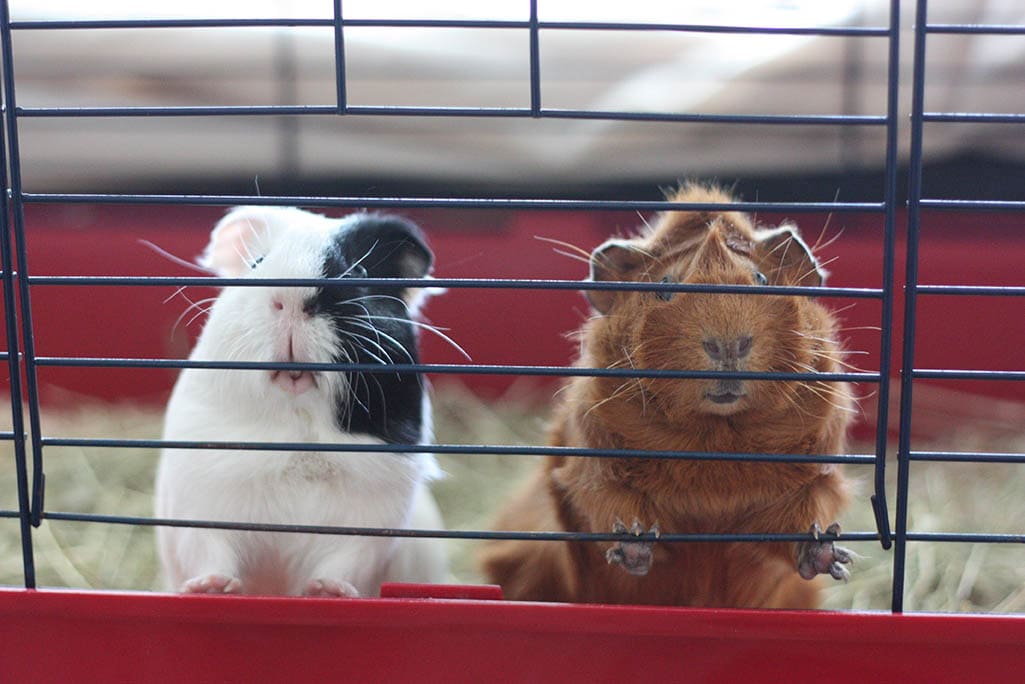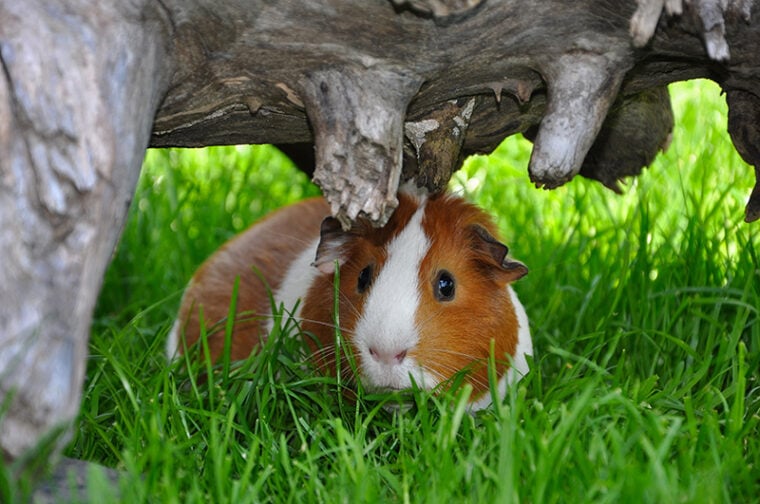
When you look into the eyes of your pet guinea pig, it’s pretty hard to imagine your little guy or gal ever living in the wild. But think about it for a second? What if your guinea pig escaped or was suddenly released into the wilderness? Could they make it out there with their tiny legs and cute ears, or would they need your help? The short answer is no, they would not survive for long. Keep reading to learn more about the possibility of your guinea pig making it out in the wild and a bit about how they became domesticated in the first place.
The Domestication of Guinea Pigs
Guinea pigs have been domesticated for centuries, with evidence suggesting they were first kept as pets as early as 5000 BC. Guinea pigs were originally found in the Andes mountains in South America and were domesticated by the Incas, who used them for food and as a source of fur – which is interesting considering their small size. Over time, they spread to other parts of the world and were kept as pets.
Today, guinea pigs are kept all over the world by people of all ages. They’re popular fun-sized pets because of their friendly and trusting personalities, their small size, and their relatively low cost and easy maintenance. Believe it or not Guinea pigs are also known for their intelligence and can be trained to do simple tricks such as coming when called – though training them will take more dedication than it would for more commonly domesticated animals like dogs and cats.
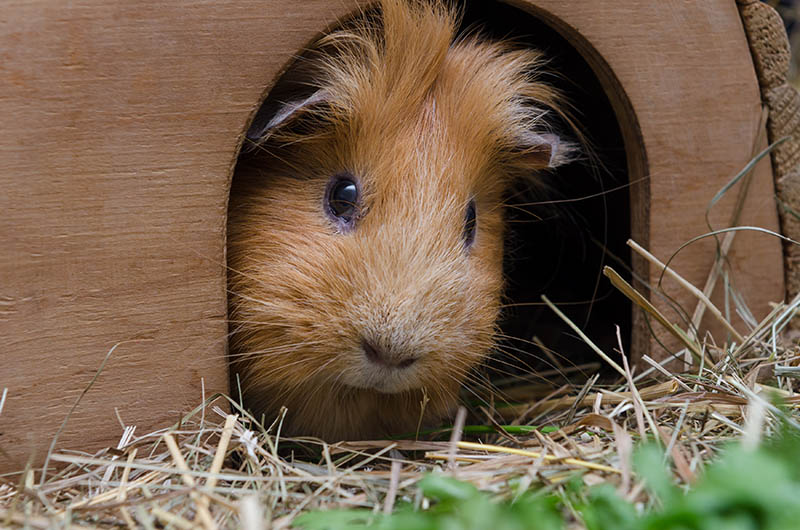
Can Domesticated Guinea Pigs Survive in the Wild?
No, if your pet guinea pig were to escape or you were to release it into the wild, it will likely not make it for very long. It’s actually illegal to release domesticated animals into the wild, including guinea pigs. The reason is that these animals have been domesticated and they won’t have the skills to survive; skills that they would have obtained if they were born in the wild and raised with their mother and herd. Guinea pigs should never be released into the wild on purpose.
Guinea Pig Skills Needed for Survival
The most important skills are the ability to find food and water, and the ability to hide from predators. Guinea pigs would also need the ability to recognize and avoid dangerous situations, such as encounters with predators or other animals. And lastly, they’d also need to be able to move quickly, as they are prey animals and will need to be able to outrun predators or dangerous situations.
Ability to Find Shelter
For example, if a pet guinea pig living in Dallas escaped from home it would need to find burrows or other hiding places in order to escape the extreme heat (which can get up to 110° Fahrenheit) during the day in summer months. Note that guinea pigs are relatively sensitive to both hot and cold temperatures.
Generally, they are tolerant of anywhere between 60 and 85° Fahrenheit. Temperatures outside of this range can put their health in the danger zone. On the other hand, guinea pigs living in New Orleans would need to find shelter from the downpours that can occur on a regular basis.
Food and Water
If you own a guinea pig, you will normally feed it pellets, rolled oats, hay, and a variety of vegetables and different fruits. But if your guinea pig now has to survive outdoors it will be forced to forage for fruits, leaves, and other vegetation all on its own, which isn’t really realistic for animals that are used to being provided with everything they need.
A domesticated guinea pig will likely either starve to death or die from exposure if not killed by a predator first – a harsh reality, yes, but definitely a real one for many domesticated prey animals released into the wild.
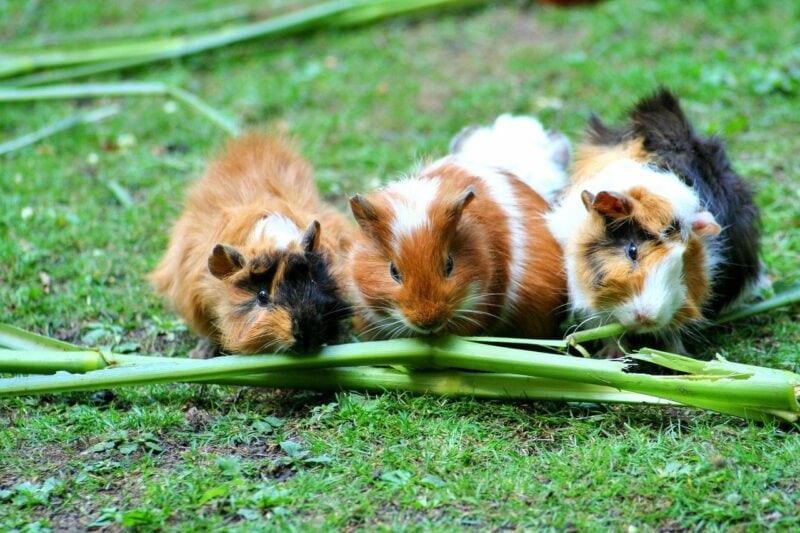
Natural Enemies of Wild Guinea Pigs
Wild guinea pigs have a number of natural enemies. These include predators such as hawks, foxes, snakes, and other animals. In some cases, like many wildlife, guinea pigs may also fall victim to disease or parasites. In order to survive, guinea pigs need to be able to recognize these dangers and take the necessary steps to avoid them – again, a domesticated guinea pig may not have learned these skills.
In addition to predators and parasites, guinea pigs in the wild also need to be aware of other animals that may compete with them for food water, and resources (like shelter). These include other rodents, raccoons, birds, and even larger mammals.
What to Do If Your Guinea Pig Is Lost Outdoors
If you live near a country or forested area and your guinea pig happens to get out and is lost in the wild, there are a few things you can do to try and locate them. First, you can search the area where they were last seen. Be sure to look in burrows, holes, and other hiding places that your guinea pig may have used to hide from predators. If you cannot find them, you can also contact local animal shelters and rescue organizations in case your guinea pig has been found.
In addition, you can also set up a feeding station in the area where your guinea pig was last seen. This can be done by placing food, water, and shelter in the area. This will help attract your guinea pig back to the area and give them the nutrients they need to survive. Note that you may want to check the feeding station frequently as it may attract other wildlife animals like squirrels, raccoons, possums, and birds.
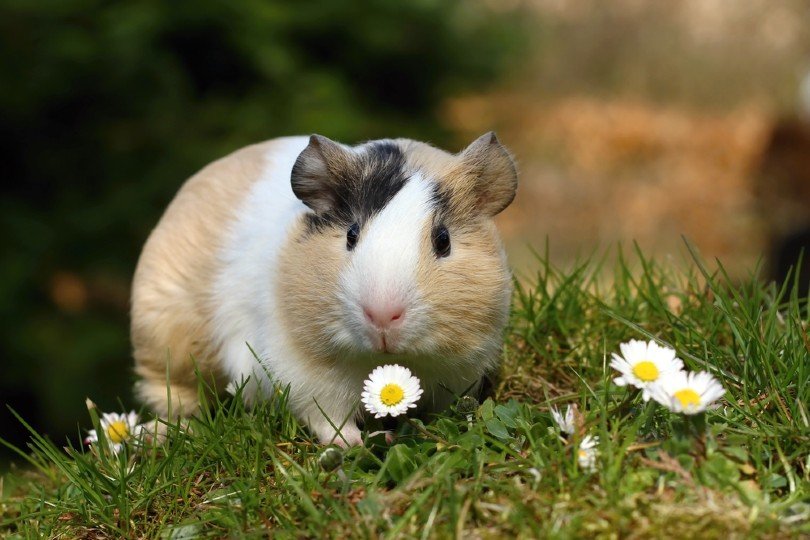
Tips on Caring for a Guinea Pig
One thing to know about guinea pig care is that it’s actually relatively easy to take care of them, especially compared to cats and dogs. They’re small animals that are typically about 2 to 2 ½ pounds in weight and about 10 to 12 inches long. They don’t require a lot of space, and they don’t need to be taken for walks or vaccinated like other pets. However, there are some basic things you need to do to ensure that your guinea pig is healthy and happy.
Home Habitat Set-up
First and foremost, you need to provide your guinea pigs with a suitable habitat. Guinea pigs are social creatures and should be housed with a guinea pig companion. They need an enclosure that is large enough for them to move around and exercise in. Most hutches and enclosures are made of wood, PVC, rubber or metal and should be about 47 inches by 24 inches by 18 inches for a pair of guinea pigs– but bigger is better to give the Guinea pigs more area to room around. Be sure to place newspaper, shredded paper, or some other type of bedding at the bottom of the cage to help keep it clean and dry. Many also chew soft materials like hay, straw, or shredded newspaper.
Guinea Pig Diet
The best way to feed your guinea pig a balanced diet is to provide them with a mixture of hay, fresh vegetables, and a pellet food that is specifically formulated for guinea pigs. Rather than muesli style food they should have extruded pellets to ensure they eat all the nutrients and not pick out favorite bits only.
Hay should be the main staple of your guinea pig’s diet. It should be fresh, and it should be a variety that is suitable for guinea pigs, such as Timothy hay. Fresh vegetables, particularly greens, should be given daily as guinea pigs need enough vitamin C for their health. So be sure to include leafy greens like red and green leaf lettuce, romaine, kale, parsley, cilantro, and even cabbage.
A rule of thumb is to provide a constant supply of fresh hay, a cup of mixed vegetables once daily per guinea pig and around 50g of pellets (check manufacturer’s guidelines).
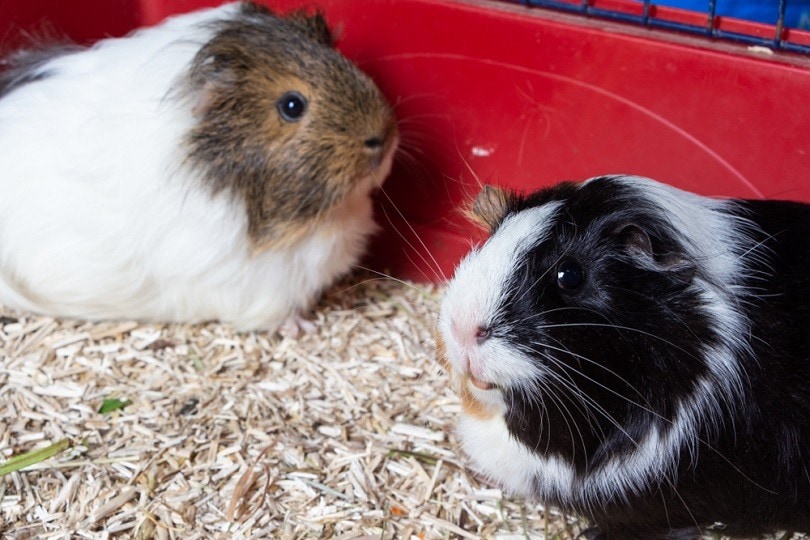
Typical Guinea Pig Temperament
You may be surprised to learn that guinea pigs are social animals, but they’re also easily stressed. They love to interact with people and other guinea pigs. Guinea pigs can purr, chirp, or squeak when they’re content, and they can squeal when they are scared or in pain.
They’re typically fairly curious and playful, and they enjoy exploring their environment – which is why having toys such as tunnels, and balls in their cage will be much appreciated. But note that it’s important to make sure that their environment is calm and peaceful. They also don’t like loud noises or sudden movements, so be mindful to always be gentle and patient when handling them.
How to Groom Guinea Pigs
Regularly grooming your guinea pig will help to keep them clean and healthy and prevent any health issues from developing. The best way to groom your guinea pig is to brush them with a soft-bristled brush once or twice a week. This will help to remove any excess fur and keep their coat looking healthy. You should also make sure to trim their nails regularly and change the bedding in their cage every week.
You can also keep your guinea pig’s ears and eyes cleaned from debris by wiping them with a damp cloth. There really aren’t any hard and fast rules when it comes to giving a guinea pig a bath, though you shouldn’t need to bathe these animals more than once a month. But if your guinea pig is starting to stink or is especially dirty, you can definitely give it a bath.
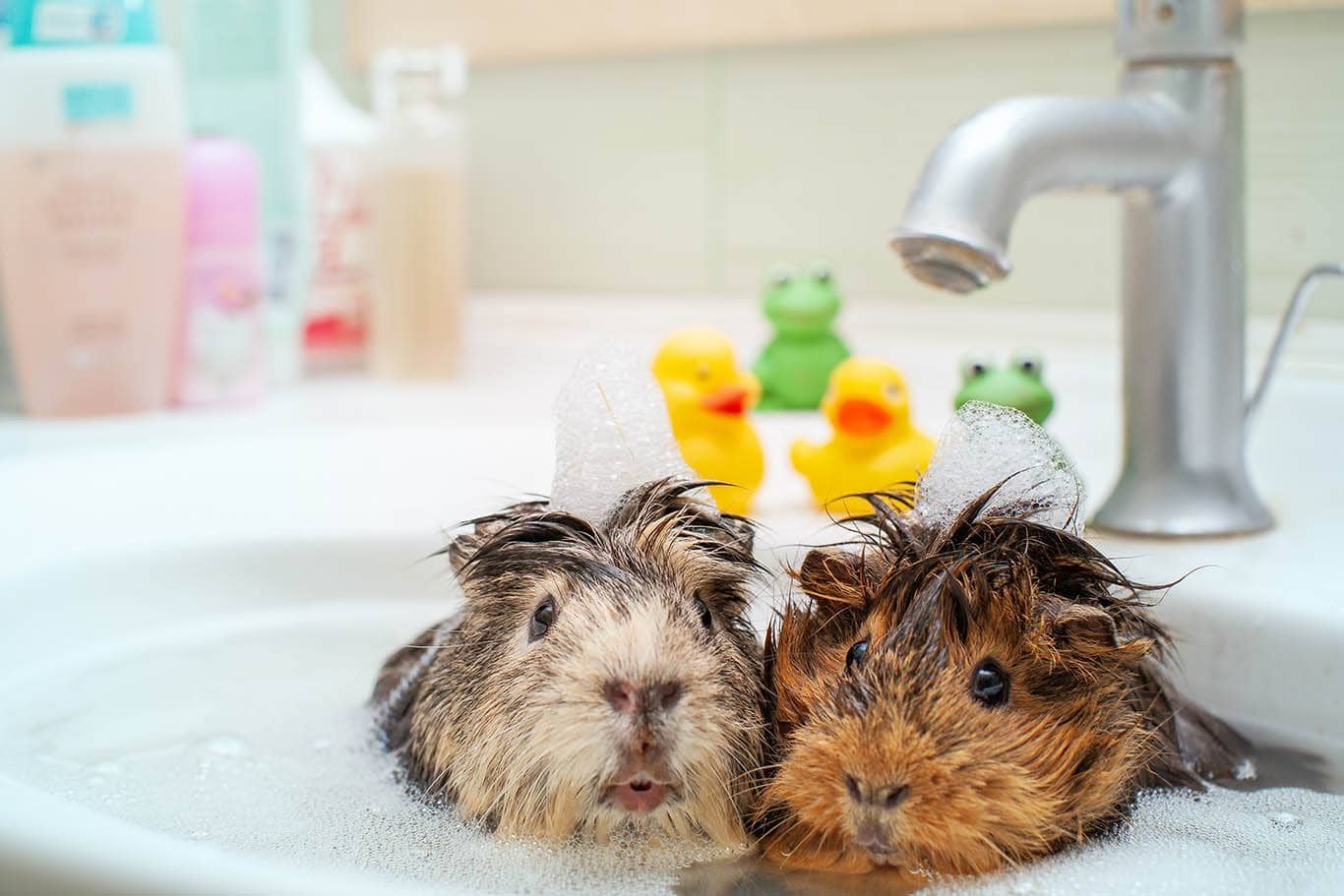
Conclusion
Exploring the wild can be an exciting experience for your guinea pig, but it also comes with risks so it’s not recommended that you take your guinea pig outdoors to let it run free. They do enjoy and should have time in the garden but keep them in an enclosed area with a fence that they can’t squeeze through. Remember your domesticated guinea pig does not have the survival skills to make it in the wild, and that the environment in the local park is vastly different to their natural habitat.
Featured Image Credit: Jumpstory




